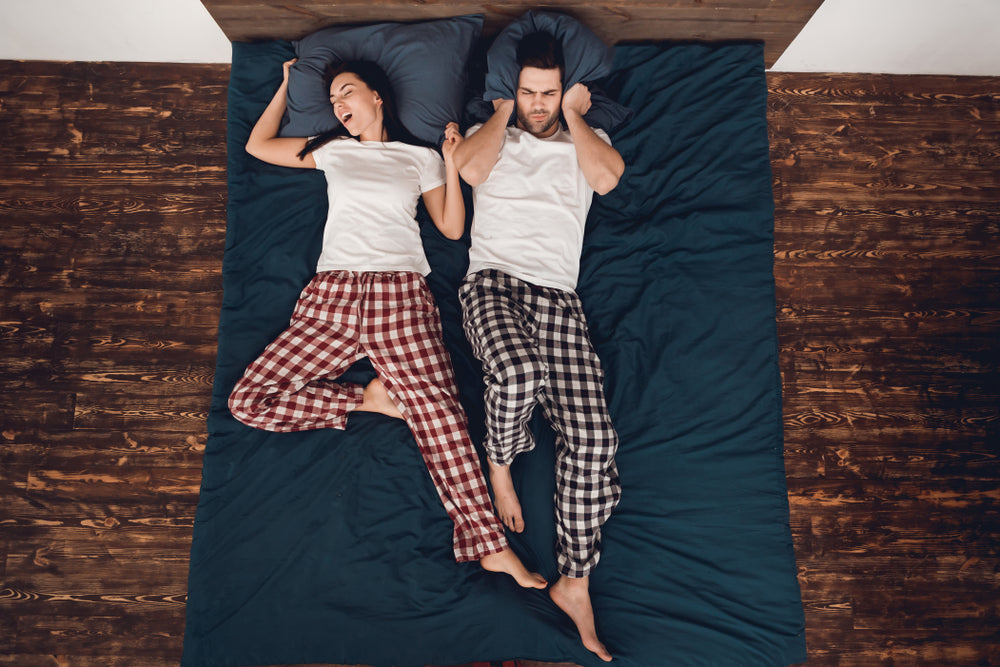Odds are you or someone you’ve shared close quarters with has had a snoring problem. Snoring happens to just about everyone at some point in their lives whether caused by an anatomy issue like a deviated septum or even just a cold or some congestion. But, there are a lot of myths surrounding snoring that can lead to misinformation. Here are the top 5 snoring myths and how you can make sure you’re not falling prey to fake news.
1. Snoring Indicates You’re In Deep Sleep
False! You may have gotten this impression from television or movies that show someone snoring so you know that they are truly asleep. While this may be funny for the episode’s storyline, it’s actually almost the opposite in real life. If you are snoring, it means you are experiencing a blockage in your airway which could be pulling you out of deep sleep. This is why people who snore chronically may also experience daytime fatigue or poor sleep.
2. It’s Uncommon for Women to Snore
Nope! Women and men have an equal likelihood of snoring. In fact, about 1 in every 4 women snore more than once per week! It is true that, statistically, men are more likely to snore and suffer from other airway obstructive conditions, like sleep apnea. But that doesn’t mean women are immune. It may not be “ladylike” to snore, but the body’s got to breathe regardless of your gender!
3. Snoring Is Completely Harmless
We all know that snoring is annoying--especially if you’re sharing a bed with a chronic snorer! But that midnight cacophony isn’t the end of your troubles because snoring could be a side effect of much more concerning illness like obstructive sleep apnea (OSA). Because sleep apnea blocks your airways and prevents you from getting deep, restorative sleep, it can not only make you tired but also puts you at risk for other, more serious conditions like heart attack, heart failure, stroke, obesity, Type II diabetes, hypertension, and even certain cancers.
If you do have OSA, it’s important that you seek out more information on sleep testing and treatment so you can sleep better and stave off more serious health concerns down the road.
4. Sleep Aids Prevent Snoring
You may believe that snoring is only the result of poor sleep, but it’s often just a side effect rather than the cause. Some have suggested that sleeping pills, whether prescribed or over the counter, can help you sleep better and, therefore, stop you from snoring. But that couldn’t be farther from the truth. In reality, sleeping pills or other “PM” aids can actually have a muscle-relaxing effect. When the muscles in your throat and mouth relax too much, it can actually make your snoring worse.
5. A Drink Before Bed Will Help
Wrong. While the logic behind a nightcap may be convincing, it’s actually worse to drink any kind of alcohol before you go to sleep. While alcohol is a depressant and will make you more sleepy initially, you may have insomnia later on in the night causing you to wake up more frequently and have poorer sleep overall.
Also, because alcohol is a muscle relaxer, it can cause your throat and mouth muscles to relax too much and block your airways, making snoring worse. If you need a drink before bed, try water or hot, caffeine-free tea.
There’s a lot of misinformation floating around on the internet, so it’s important to do your research before trying any kind of “home remedy.” But, if you know you are a chronic snorer, it could likely be the result of a sleep disorder like OSA. You can talk to your doctor about your snoring, or you can enjoy the convenience of a home sleep test by contacting ApneaMed. You’ll gain the insights you need to fix your snoring and get back to restful sleep.

